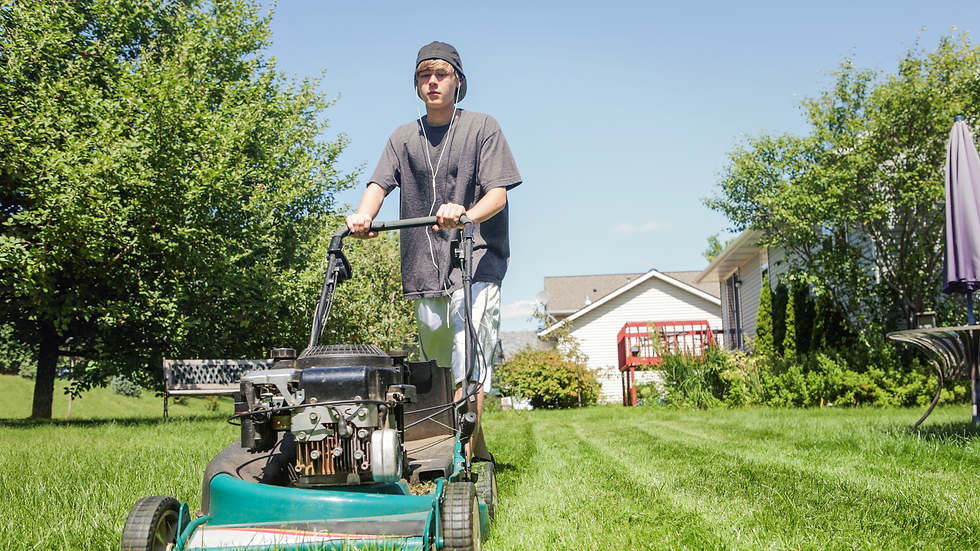Digital Detox
- Ross Berry
- Sep 26
- 6 min read

Young People - Being Active!
It’s so easy today to become dependent – almost attached – to your digital device. And it’s even harder for young people who get exposed to all manner of devices – from video games to iPhones to a digital world that can sometimes become their reality. Today in the Sunshine Report, we celebrate the joy of breaking free! The freedom where we can return to a moment of liberation – experiencing the real world from time to time – free from our digital dependency. With a special emphasis on how this can be such a vitally important step for the next generation.
Stepping away from our screens, we discover a world teeming with genuine connection and endless possibilities. For young people, choosing moments away from devices opens the door to authentic friendships—ones built on shared laughter, real conversations, and unforgettable experiences under open skies. When we gather for a pickup game, a group hike, or a spontaneous adventure, the bonds created are far deeper than any message chain or group chat could ever offer.
As we unplug, the simple wonders of the real world come alive. Each day holds the potential for discovery—whether it’s feeling the grass under foot, getting lost in a new book, or listening to the rhythms of city streets and quiet woods. For young people especially, engaging with the world in its raw, beautiful form replaces virtual isolation with moments of awe and genuine happiness, nurturing resilience and creativity.
In these unplugged moments, a new confidence emerges. Young people learn the thrill of trying something new without the safety net of an “undo” button, embracing challenges and learning from mistakes. Each hike, art project, or live conversation becomes a test of resourcefulness and courage, building character in ways that screens simply can’t replicate.
And most importantly, breaking free brings us hope—hope for stronger communities, more joyful youth, and a generation that learns the value of presence. By reconnecting with each other and the real world, we inspire kindness, empathy, and lasting happiness. In this digital age, the greatest act of joy may simply be to put down the phone and step outside, together. Please give it a try…TODAY!!!
The Joy of Outdoor Activities

I remember as a kid, the excitement of bursting out the backdoor and getting ready to go play outdoors with my friends. Not all that much has changed. Fresh air and open space remain some of the best gifts we can give young people. Hiking a trail, tossing a ball, or even walking the family dog can spark energy, improve focus, and lift the spirit. The outdoors helps kids and teens build stronger bodies, sharper minds, and healthier moods.
Across the country, programs are encouraging families to take advantage of these benefits. “Every Kid Outdoors” provides free national park passes to fourth graders, creating opportunities for children to discover nature firsthand. Local recreation departments and summer camps in small towns are also doing their part to keep kids moving and engaged.
Research backs up what families have known for generations. Kids who spend regular time outside often perform better in school and feel less stress. They also develop problem-solving skills and creativity in ways that screens can’t provide. Nature becomes both a playground and a teacher.
For many families, outdoor time is built into simple routines. Evening bike rides, weekend fishing trips, or afternoons exploring local trails all create memories that last. These shared experiences strengthen relationships while building a healthy rhythm of life.
Every patch of grass, every park, and every trail offers a chance for growth. Stepping outside connects kids not only to nature but also to their communities, families, and themselves.
Riding Bicycles – Freedom and Exercise

Do you remember the first time you rode a bicycle? I do. And it wasn’t easy. Learning to ride a bike is a milestone that sticks with most people. The first successful trip down the sidewalk without training wheels represents freedom, independence, and confidence. Bikes have always been a way for kids to see the world on their own terms.
For many towns, bicycles were once the main symbol of youth independence. Side streets and sidewalks gave kids the freedom to explore. Today, efforts to build safe bike lanes and start community bike-share programs are helping bring that experience back.
Some communities are going further. Earn-a-bike workshops give kids the chance to repair donated bikes, teaching both mechanical skills and responsibility. Once fixed, the bikes are theirs to keep. These programs provide transportation, but they also build pride and self-reliance.
Parents and grandparents often recall riding until the streetlights flickered on. That joy has not disappeared. Riding builds strength and stamina, but it feels more like play than work. It is a healthy habit wrapped in fun.
Bikes continue to offer what they always have: freedom, movement, and adventure. In a time filled with screens and distractions, bicycles remain a simple way for kids to connect with their surroundings and discover independence.
Unstructured Play – What Life in the Neighborhood Used to Be Like

There was a time when kids spent whole afternoons outside, inventing games and exploring their neighborhoods. I know because that’s how it worked for my brother and me. We knocked on doors, organized baseball games across the street, and stayed out until the streetlights came on. This kind of unstructured play built more than memories. It built resilience, creativity, and social skills.
Psychologist Peter Gray has shown how play is essential to childhood development. When kids create their own games, they learn to solve problems, negotiate rules, and navigate disagreements. They gain independence and confidence by making decisions without adults constantly directing them.
Some towns are finding ways to encourage this freedom again. Block parties close off streets to cars so children can take over the pavement. Communities organize “screen-free weekends” to encourage families to spend time outdoors. The “playborhood” idea is also spreading - spurring neighborhoods intentionally designed to encourage spontaneous play.
The results are powerful. Kids who have more time for free play show stronger social bonds and better emotional balance. They also learn how to collaborate, compromise, and take risks in healthy ways.
Unstructured play is a necessity. By giving kids space to explore and create, we prepare them for adulthood in ways that structured activities cannot match.
Getting a Job – Mowing Lawns, Raking Leaves, Young Entrepreneurs

It’s such a positive moment. For many young people, a first job is a rite of passage. Whether it’s mowing lawns, babysitting, or running a lemonade stand, these small ventures build responsibility and independence. They also create a sense of pride that comes from earning money and contributing to the community.
Across the country, teens are turning part-time work into real opportunities. Some run lawn care businesses during the summer, while others sell crafts at local farmers markets. Communities are encouraging these efforts through youth business fairs and mentorship programs that guide kids from idea to action.
These jobs teach lessons that stay with people for life. Punctuality, communication, and follow-through all matter. The satisfaction of doing a job well builds confidence in ways that school assignments often can’t.
Neighbors play an important role too. Hiring a local teen to mow the lawn or watch the dog supports more than a task—it supports the growth of the next generation. When communities create platforms for youth entrepreneurship, everyone benefits.
Work rooted in community builds character. It shows young people that their efforts have value and that they can make a difference right where they live.
Positive Profile: Erin Loechner and The Opt-Out Family

This week we are delighted to highlight a leader in the Digital Detox Movement with her work that centers on families – Erin Loechner.
Erin has become a national voice for families who want to live with more presence and less screen time. Through her book The Opt-Out Family and her speaking engagements, she has inspired thousands of parents to rethink how they structure family life.
Her story began with small, intentional choices. She created quiet corners in her home, set aside tech-free weekends, and built routines that emphasized connection over distraction. These steps grew into a philosophy that families across the country now look to for guidance.
What makes Erin’s approach appealing is her balance of practicality and grace. She acknowledges that technology has its place but reminds families that they can set boundaries that feel realistic. Her message encourages people to make small, consistent changes rather than chase perfection.
Her influence extends into schools, parenting groups, and local communities. By sharing her story and offering practical strategies, she has given families tools to reclaim peace and presence in their homes. From family dinners without phones to community events that encourage face-to-face connection, her ideas make a difference.
At its heart, Erin’s mission is about helping kids thrive in the real world. By showing families how to step back from screens and step into life, she points the way toward stronger relationships and healthier communities.
Quote of the Week: Digital Detox

“Spend some time disconnected from technology and reconnected with the world around you. It’s worth it.” – Germany Kent



Comments